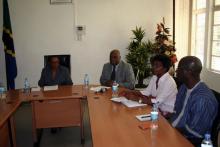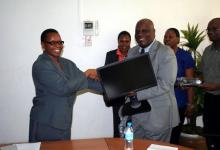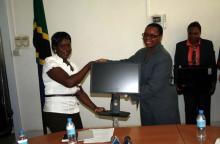The World Health Organization hands over 17 computers to the Ministry of Health and Social Welfare to strengthen medicines management in the districts
On the 11th of October, 2013, the WHO Country Office handed over to the Ministry of Health and Social Welfare 17 computers to strengthen management of medicines in the 17 peer learning districts.
The handing over ceremony which took place at the Ministry of Health premises, was presided over by the Acting Chief Medical Officer, Dr Margaret Mhando; Senior Officers from the Ministry of Health and Social Welfare, pharmacists from the 17 Peer Learning Districts, the World Health Organization Representative for Tanzania, Dr. Rufaro Chatora, WHO staff, JSI facilitators and members of the media.
The Assistant Director, Pharmaceutical Services, Mr Henry Irunde welcomed the guests and informed everyone how the Peer Learning Districts were conceptualized by the MOHSW. These are best performing districts in the country identified so that other districts can learn from them. It was thus expected that with the computerization of the medicines management systems, pharmacists from these districts will act as Trainers of Trainers for other districts.
In his handing over speech, the WHO Representative, Dr. Rufaro Chatora, commended the Ministry of Health for its laudable efforts and commitment to providing quality, efficacious and safe medicines and health technologies to all Tanzanians. He further said that “the computerization of the medicines management system is hoped to address to a certain extent the challenges of stock-outs which has persistently been observed in various assessments and HMIS monitoring by the MOHSW and its Partners. It will also facilitate the work of district pharmacists by enabling faster collection, transmission, and aggregation of data. This will result in data being available more quickly for timely decision making and actions to help ensure products are available where and when needed.”
In her acceptance speech, the Acting Chief Medical Officer, said “The baseline assessment conducted in May 2013, envisaged that in some districts, CHMT members have limited knowledge and skill in computing and data management. In addition, there was lack of Health Management Information System (HMIS) tools including computers. Furthermore, it was found that, although most of the staff in the health facilities underwent integrated logistic system (ILS) training, good drug management were not followed. There was inadequate record keeping especially in updating ledger and dispensing books. Poor management of medicines and medical supplies have resulted to fluctuations in the availability of those vital commodities.” She expected that the recipients will use the knowledge acquired in improving drug management. It was also her expectation that these computers will support districts in drug management and hence improve records keeping, preparation and aggregation of ILS orders and submit quality report in time.
The Acting Chief Medical Officer then handed over the computers to Magu District pharmacist, Ms Sarah Magingi on behalf of the representatives from Sumbawanga DC, Iramba DC, Bahi DC, Kilolo DC, Mbinga DC, Rungwe DC, Mbozi DC, Meru DC, Singida Rural, Serengeti DC, Magu DC, Nzega, Kasulu, Kilosa, Kibaha Rural, Mtwara MC and Nachingwea MC.
The handing over of the computers was preceded by a four days training of the district pharmacists on eLMIS. The training was organised by the MOHSW with financial support from WHO through the Renewed EU/ACP/WHO Partnership in collaboration with the JSI. The JSI Country Director, Mr Ousmane Dia said that the eLMIS tool developed by JSI to be used by districts and health facilities was the first of its kind in Africa and was expected to improve greatly logistics management. eLMIS is a web-based application which computerizes existing paper-based logistics management information systems (LMIS) and collects, manages, and uses logistics data. The goal of eLMIS is to improve access to accurate, timely and routine consumption data; Real-time logistics management capabilities covering point of origin to point of consumption; and demand forecasting, capacity planning and modelling based on consumption. The training which has started with 17 districts is expected to roll out to other districts in the country.






